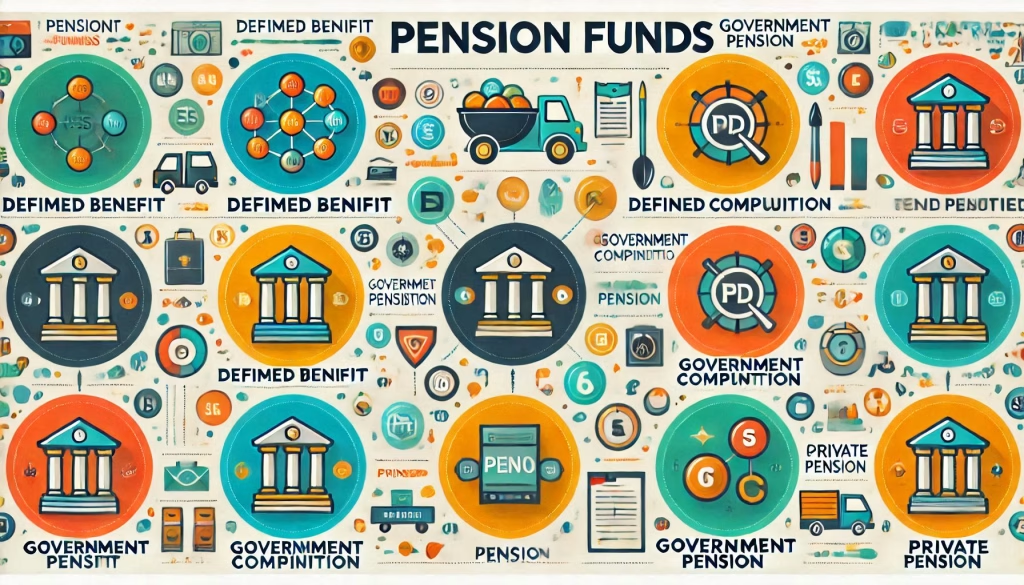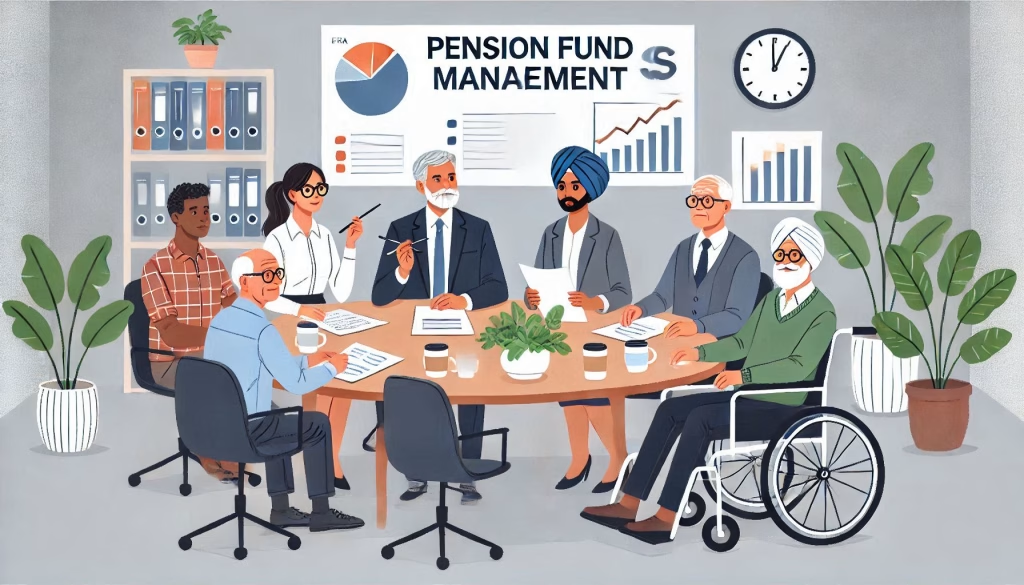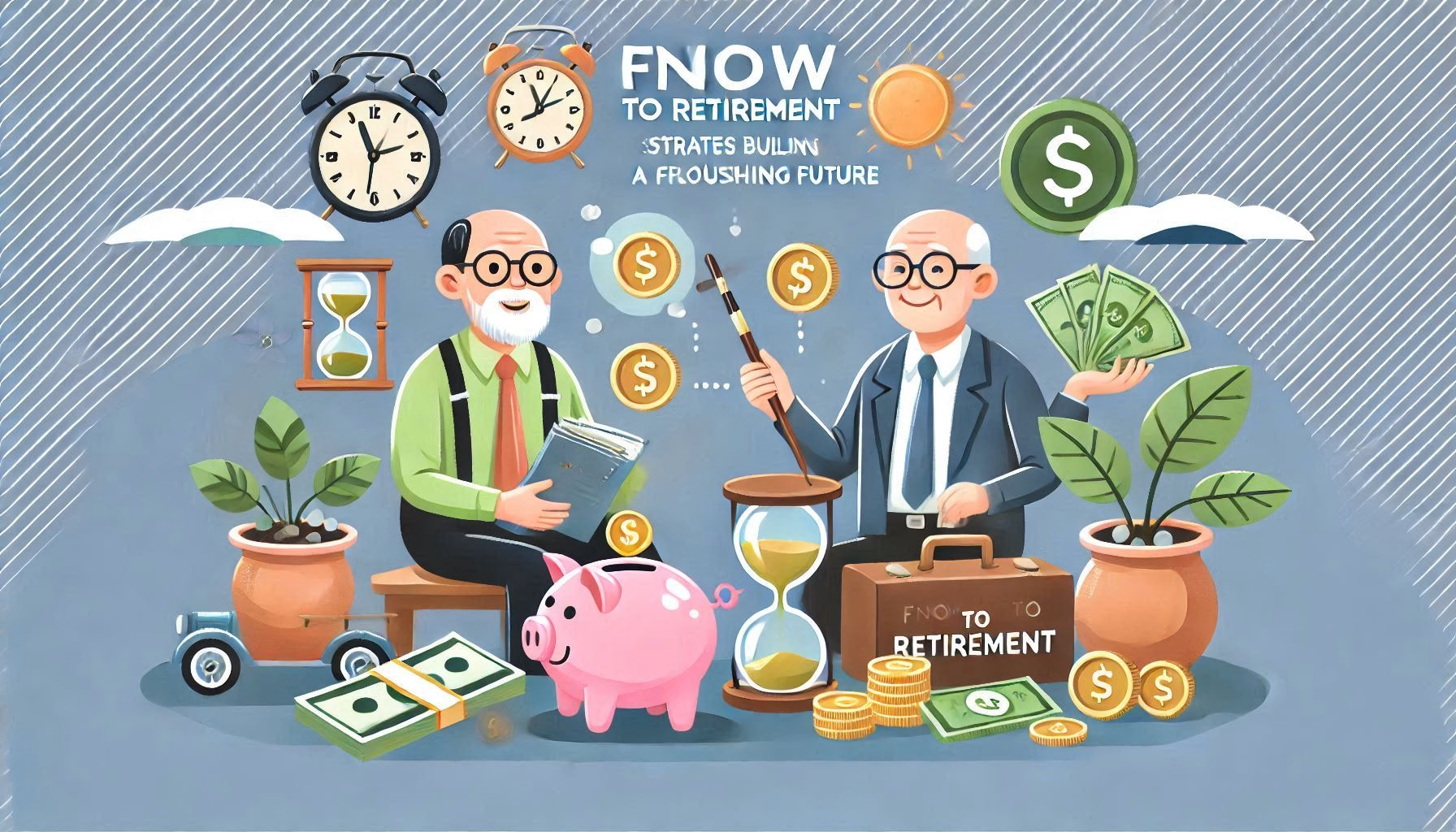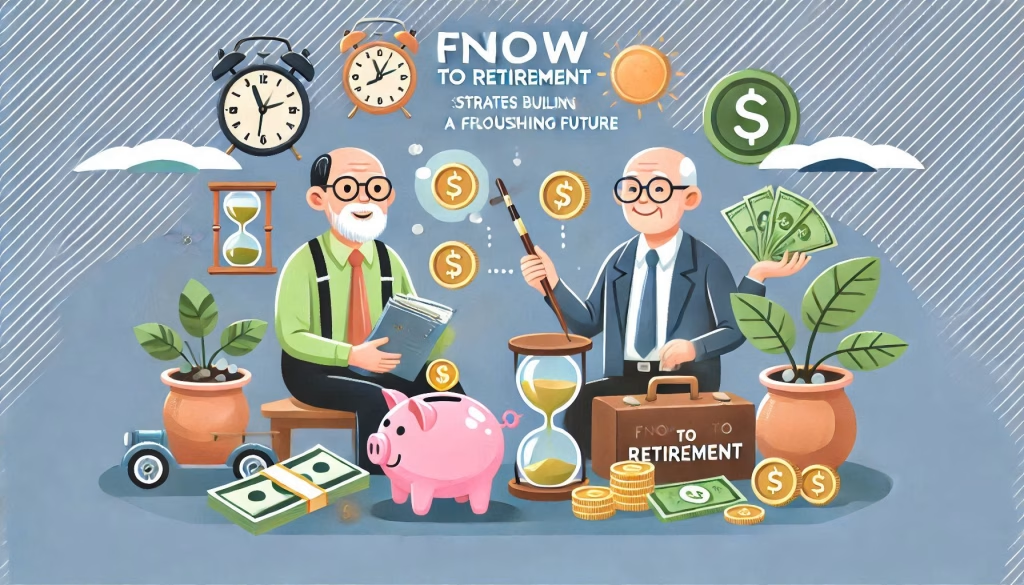Table of Contents
- Overview
- What is a Pension Fund?
- Key Components of a Pension Fund
- Types of Pension Funds
- Benefits of Pension Funds
- Management of Pension Funds
- Challenges Facing Pension Funds
- Future Trends in Pension Funds
- Reasons for the Importance of Pension Funds
- Two Essential Preparations for Retirement
- Tips for Preparing for Retirement Funds
- The Conclusion
Overview
Retirement marks a time when an individual ceases to be active in their profession, leading to significant shifts, particularly in financial status. It’s a transition from the regularity of a monthly income to its absence.
Hence, it is crucial to establish a pension fund while you are still in your productive years. This can be achieved through saving or investing to ensure a serene and affluent retirement. Additionally, utilizing severance pay from your employer can provide support for ongoing living expenses.
What is a Pension Fund?

A pension fund is a financial arrangement designed to provide individuals with income during their retirement years. It is a pool of assets managed by a financial institution or a pension plan administrator, with the primary goal of generating returns to support retirees.
Pension funds play a crucial role in ensuring financial security for individuals after they retire from active employment. This article explores the key components, types, benefits, and management of pension funds.
Key Components of a Pension Fund

Pension funds consist of several key components that work together to provide retirement benefits to participants. These components include:
Key Components of a Pension Fund No.1
InsuranceWhat.com
Contributions
Contributions are the funds paid into the pension plan by both the employer and the employee. These contributions are typically made on a regular basis, such as monthly or annually. The amount contributed is often based on a percentage of the employee’s salary.
Key Components of a Pension Fund No.2
InsuranceWhat.com
Investment Portfolio
The contributions made to the pension fund are invested in a diversified portfolio of assets, including stocks, bonds, real estate, and other investment vehicles. The goal of the investment portfolio is to generate returns that will grow the fund over time and provide sufficient income for retirees.
Key Components of a Pension Fund No.3
InsuranceWhat.com
Benefit Payments
Benefit payments are the periodic payments made to retirees from the pension fund. These payments are typically made on a monthly basis and are designed to provide a steady stream of income during retirement. The amount of the benefit payment is usually based on factors such as the employee’s salary, years of service, and the terms of the pension plan.
Key Components of a Pension Fund No.4
InsuranceWhat.com
Plan Administrator
The plan administrator is responsible for managing the pension fund and ensuring that it operates in accordance with the plan’s rules and regulations. The administrator may be a financial institution, a government agencyAgent People who work and are tied to insurance companies to find and serve policyholders. Insurance company employees who are tasked with marketing products or serving prospective customers, starting from submitting the policy provisions to the contents of the policy agreement after becoming a policyholder., or a private company.
Types of Pension Funds

There are several types of pension funds, each with its own characteristics and benefits. The most common types of pension funds include:
Types of Pension Funds No.1
InsuranceWhat.com
Defined Benefit Plans
Defined benefit plans promise a specific benefit amount to retirees based on a predetermined formula. This formula typically takes into account factors such as the employee’s salary, years of service, and age at retirement. The employer is responsible for ensuring that there are sufficient funds to pay the promised benefits. Defined benefit plans provide retirees with a predictable and stable income, but they also place the investment riskRisk Risk is a loss that occurs to the insured individual or object. Various bad possibilities could happen to someone. on the employer.
Types of Pension Funds No.2
InsuranceWhat.com
Defined Contribution Plans
Defined contribution plans do not promise a specific benefit amount at retirement. Instead, the contributions made by the employer and employee are invested in an individual account for the employee. The retirement benefit is based on the amount of contributions made and the investment returns earned on those contributions. Common examples of defined contribution plans include 401(k) plans and individual retirement accounts (IRAs). In defined contribution plans, the investment risk is borne by the employee.
Types of Pension Funds No.3
InsuranceWhat.com
Hybrid Plans
Hybrid plans combine elements of both defined benefit and defined contribution plans. One common type of hybrid plan is the cash balance plan, which provides employees with an individual account that grows based on a fixed interest rate or a formula tied to investment returns. Hybrid plans aim to provide a balance between the predictability of defined benefit plans and the flexibility of defined contribution plans.
Types of Pension Funds No.4
InsuranceWhat.com
Public Pension Plans
Public pension plans are established by government entities to provide retirement benefits to public sector employees, such as teachers, police officers, and firefighters. These plans are typically defined benefit plans and are funded by contributions from both the government and the employees.
Benefits of Pension Funds

Pension funds offer several benefits to both employees and employers:
Benefits of Pension Funds No.1
InsuranceWhat.com
Financial Security
Pension funds provide retirees with a steady and reliable source of income during their retirement years. This financial security helps retirees maintain their standard of living and meet their financial needs.
Benefits of Pension Funds No.2
InsuranceWhat.com
Tax Advantages
Contributions to pension funds are often tax-deductible, and the investment returns within the fund grow on a tax-deferred basis. This means that employees can save for retirement more efficiently and reduce their current tax liability.
Benefits of Pension Funds No.3
InsuranceWhat.com
Attracting and Retaining Talent
Offering a pension plan can be an attractive benefit for employers looking to recruit and retain talented employees. A comprehensive pension plan can enhance an employer’s overall compensation package and make the organization more competitive in the job market.
Benefits of Pension Funds No.4
InsuranceWhat.com
Professional Management
Pension funds are typically managed by professional investment managers who have the expertise and experience to make informed investment decisions. This professional management helps ensure that the fund’s assets are invested wisely and that the fund can meet its long-term obligations.
Management of Pension Funds

Effective management of pension funds is crucial to ensure that they can meet their obligations to retirees. Key aspects of pension fund management include:
Management of Pension Funds No.1
InsuranceWhat.com
Investment Strategy
The investment strategy of a pension fund is designed to achieve the fund’s long-term objectives while managing risk. This strategy typically involves diversifying the fund’s assets across different asset classes, such as stocks, bonds, and real estate. The investment strategy is guided by the fund’s investment policyPolicy The policy is a binding agreement and is agreed upon by the insurance company and policyholder in writing. An agreement made by the policyholder with an insurance company. statement, which outlines the fund’s goals, risk tolerance, and investment guidelines.
Management of Pension Funds No.2
InsuranceWhat.com
Asset Allocation
Asset allocation is the process of determining the optimal mix of assets in the pension fund’s portfolio. This involves balancing the need for growth with the need for stability and income. The asset allocation strategy is based on factors such as the fund’s investment horizon, risk tolerance, and the demographics of the plan participants.
Management of Pension Funds No.3
InsuranceWhat.com
Risk Management
Managing risk is a critical aspect of pension fund management. This involves identifying, assessing, and mitigating various types of risksRisk Risk is a loss that occurs to the insured individual or object. Various bad possibilities could happen to someone., such as market risk, interest rate risk, and longevity risk. Risk management strategies may include diversification, hedging, and the use of derivatives.
Management of Pension Funds No.4
InsuranceWhat.com
ActuarialActuarial Science in insurance that applies mathematical, financial, and statistical methods to estimate or calculate risk. Valuation
Actuarial valuation is the process of assessing the financial health of the pension fund by estimating the present value of its future liabilities. This involves analyzing factors such as the demographics of the plan participants, the expected rate of return on investments, and the plan’s funding status. Actuarial valuations help ensure that the fund has sufficient assets to meet its future obligations.
Management of Pension Funds No.5
InsuranceWhat.com
Regulatory Compliance
Pension funds are subject to various regulations and oversight by government agenciesAgent People who work and are tied to insurance companies to find and serve policyholders. Insurance company employees who are tasked with marketing products or serving prospective customers, starting from submitting the policy provisions to the contents of the policy agreement after becoming a policyholder.. Compliance with these regulations is essential to ensure the fund’s integrity and protect the interests of plan participants. This includes adhering to funding requirements, reporting and disclosure obligations, and fiduciary responsibilities.
Challenges Facing Pension Funds

Despite their benefits, pension funds face several challenges that can impact their ability to provide retirement benefits. Some of the key challenges include:
Challenges Facing Pension Funds No.1
InsuranceWhat.com
Funding Shortfalls
Many pension funds face funding shortfalls, where the fund’s liabilities exceed its assets. This can result from factors such as lower-than-expected investment returns, increased life expectancy of retirees, and insufficient contributions. Addressing funding shortfalls often requires increased contributions, benefit reductions, or changes to the investment strategy.
Challenges Facing Pension Funds No.2
InsuranceWhat.com
Market Volatility
Pension funds are exposed to market volatility, which can impact the value of their investment portfolios. Significant market downturns can result in substantial losses for pension funds, making it challenging to meet their long-term obligations.
Challenges Facing Pension Funds No.3
InsuranceWhat.com
Demographic Changes
Changes in demographics, such as an aging population and declining birth rates, can impact the sustainability of pension funds. An increasing number of retirees relative to active workers can strain the fund’s resources and require adjustments to contributions and benefits.
Challenges Facing Pension Funds No.4
InsuranceWhat.com
Regulatory Changes
Pension funds are subject to regulatory changes that can impact their operations and funding requirements. Staying compliant with evolving regulations requires ongoing monitoring and adjustments to the fund’s policiesPolicy The policy is a binding agreement and is agreed upon by the insurance company and policyholder in writing. An agreement made by the policyholder with an insurance company. and practices.
Future Trends in Pension Funds

The landscape of pension funds is continually evolving, with several trends shaping their future. Some of the key trends include:
Future Trends in Pension Funds No.1
InsuranceWhat.com
Shift to Defined Contribution Plans
There is a growing trend towards defined contribution plans, as employers seek to manage their financial liabilities and transfer investment risk to employees. This shift is driven by factors such as increased regulatory requirements, funding challenges, and changing workforce dynamics.
Future Trends in Pension Funds No.2
InsuranceWhat.com
Focus on Sustainability
Pension funds are increasingly incorporating environmental, social, and governance (ESG) factors into their investment strategies. This focus on sustainability aims to generate long-term value while addressing social and environmental challenges.
Future Trends in Pension Funds No.3
InsuranceWhat.com
Technological Advancements
Technological advancements are transforming the management of pension funds. Innovations such as data analytics, artificial intelligence, and blockchain are enhancing investment decision-making, risk management, and operational efficiency.
Future Trends in Pension Funds No.4
InsuranceWhat.com
Enhanced Participant Engagement
Pension funds are placing greater emphasis on engaging participants and providing them with tools and resources to make informed retirement planning decisions. This includes offering personalized investment advice, financial education, and digital platforms for managing retirement accounts.
Reasons for the Importance of Pension Funds

Pension funds play a crucial role in ensuring financial security and stability for individuals during their retirement years. They are designed to provide a steady stream of income to retirees, helping them maintain their standard of living and meet their financial needs.
As previously mentioned, pension funds are essential for covering various needs during old age, ranging from daily expenses to medical costs. This is because the body is more prone to illnesses as we age. With the cost of living and healthcare expenses rising annually, it’s wise to start preparing ample pension funds while one is still in the workforce.
The nominal amount required varies from person to person. It can be estimated by examining one’s current lifestyle and the total monthly expenditure on necessities.
This article explores the various reasons why pension funds are important and how they contribute to the well-being of retirees and the overall economy.
Reasons for the Importance of Pension Funds No.1
InsuranceWhat.com
Financial Security in Retirement
One of the primary reasons for the importance of pension funds is the financial security they provide to retirees. After years of active employment, individuals rely on their pension funds to support their living expenses when they are no longer earning a regular income.
Pension funds ensure that retirees have a stable and predictable source of income, allowing them to cover essential expenses such as housing, food, healthcare, and utilities.
Reasons for the Importance of Pension Funds No.2
InsuranceWhat.com
Protection Against Longevity Risk
Longevity risk refers to the risk of outliving one’s savings. With increasing life expectancy, many individuals face the possibility of living longer than anticipated, which can strain their financial resources.
Pension funds help mitigate this risk by providing a lifetime income stream, ensuring that retirees do not run out of money during their retirement years. This protection against longevity risk is particularly important as it provides peace of mind and financial stability to retirees.
Reasons for the Importance of Pension Funds No.3
InsuranceWhat.com
Encouragement of Long-Term Savings
Pension funds encourage individuals to save for the long term by providing structured and disciplined savings mechanisms. Contributions to pension funds are typically made on a regular basis, either by the employer, the employee, or both.
This regular saving habit helps individuals accumulate a significant amount of money over their working years, which can then be used to support their retirement. The long-term nature of pension funds also allows for the compounding of investment returns, further enhancing the growth of retirement savings.
Reasons for the Importance of Pension Funds No.4
InsuranceWhat.com
Tax Advantages
Pension funds often come with tax advantages that make them an attractive savings option. Contributions to pension funds are usually tax-deductible, reducing the individual’s taxable income and lowering their current tax liability.
Additionally, the investment returns within the pension fund grow on a tax-deferred basis, meaning that taxes on the earnings are not paid until the funds are withdrawn during retirement. These tax benefits provide an incentive for individuals to save for their retirement through pension funds.
Reasons for the Importance of Pension Funds No.5
InsuranceWhat.com
Professional Investment Management
Pension funds are typically managed by professional investment managers who have the expertise and experience to make informed investment decisions. These managers are responsible for selecting and managing a diversified portfolio of assets, including stocks, bonds, real estate, and other investment vehicles.
The goal is to generate returns that will grow the pension fund over time and provide sufficient income for retirees. Professional investment management helps ensure that the pension fund’s assets are invested wisely and that the fund can meet its long-term obligations.
Reasons for the Importance of Pension Funds No.6
InsuranceWhat.com
Economic Stability
Pension funds contribute to the overall stability of the economy by providing a reliable source of income to retirees. When retirees have a steady income, they are more likely to spend money on goods and services, which stimulates economic activity.
This spending supports businesses, creates jobs, and contributes to economic growth. Additionally, pension funds are significant institutional investors in financial markets, providing capital to businesses and governments. This investment activity helps promote economic development and stability.
Reasons for the Importance of Pension Funds No.7
InsuranceWhat.com
Social Welfare and Reduced Dependency
Pension funds play a vital role in social welfare by reducing the dependency of retirees on government assistance programs. When individuals have access to adequate pension benefits, they are less likely to rely on social security or other public assistance programs to meet their financial needs.
This reduces the burden on government resources and allows for more efficient allocation of public funds. Pension funds, therefore, contribute to the overall well-being of society by promoting financial independence and reducing poverty among retirees.
Two Essential Preparations for Retirement

To ensure the pension fund is adequate, two key factors must be considered. These include, among others.
Two Essential Preparations for Retirement No.1
InsuranceWhat.com
Retirement Needs
The first step in preparing for retirement is to understand your needs during this period. This includes food, transportation, electricity, water, housing, medical expenses, and emergency funds.
Additionally, consider calculating the potential inflation over several years of retirement. Inflation typically occurs annually, and the rate can increase due to specific governmental conditions within a country.
Inflation leads to a yearly increase in the cost of essential goods. By allocating additional funds for retirement, one can ensure an undisturbed post-retirement life.
Two Essential Preparations for Retirement No.2
InsuranceWhat.com
Retirement Time
The subsequent step in preparing for retirement funds is to determine the timing of retirement. Many individuals aspire to retire early. The critical question is, are you prepared for this decision?
Choosing to retire early is a challenging decision, particularly for individuals who have been in the workforce for only 10-15 years. It’s advisable to establish a retirement age now to have a clear plan for the coming years.
For instance, if you begin your career at 23 and aim to retire at 50, you have a productive span of 27 years. It’s crucial to decide the percentage of your salary to allocate for retirement savings. Moreover, consider increasing this percentage as your salary and position advance.
Tips for Preparing for Retirement Funds

Preparing for retirement is a crucial aspect of financial planning that requires careful consideration and strategic decision-making. Building a robust retirement fund ensures that you can maintain your standard of living and enjoy financial security during your retirement years.
Tips for Preparing for Retirement Funds No.1
InsuranceWhat.com
Understanding Your Current Financial Situation
The ideal time to start preparing a retirement fund is from the very first day of employment. While it may seem premature, recognizing the significance of a retirement fund early on aids in financial management. This is particularly crucial when the initial salary is modest.
Nonetheless, certain companies may implement retirement policies at 55 years of age. Irrespective of these age limits, individuals can collect pension funds in the amounts they desire, provided they are cognizant of their current financial situation.
Consider finding a side job if it’s feasible. The earlier you start accumulating pension funds, the better your chances of retiring early. This can provide the opportunity to live life more peacefully and concentrate on activities you enjoy.
Tips for Preparing for Retirement Funds No.2
InsuranceWhat.com
Saving and Investing
Besides allocating funds for retirement, saving is equally important. Savings can serve various purposes, from purchasing necessities to augmenting your retirement reserves.
If your salary allows, consider investing. It’s one of the quickest methods to increase your wealth. The potential returns are higher, particularly with riskier assets like stocks.
The optimal percentages for savings and investment are 20% and 10%, respectively. With disciplined practice, wealth accumulation will occur more rapidly.
Tips for Preparing for Retirement Funds No.3
InsuranceWhat.com
Secure with Insurance
As we age, our health typically deteriorates. Therefore, it is advantageous to be knowledgeable about insurance products. Health and life insurance are the two most essential types of insurance to consider.
Both offer distinct advantages. Health insurance safeguards your finances in case of illness, whereas life insurance provides protection against the financial consequences of death. The insurance company will disburse a specified sum of money, fulfilling its obligation in exchange for the premiumsPremium The money that must be paid at a certain time is the obligation of the insurance policyholder. The amount of premium paid is determined by the policy and approval of the insurance company in accordance with the conditions of the insured. The nominal payment approved by policyholders and insurance companies. Premium payment will be made according to the agreement, it can be monthly, yearly, or according to the agreement. paid under the insurance policyInsurance policy An agreement between the policyholder and the insurance company to perform the obligations as agreed by both parties..
Select an insurance company that provides the most advantageous scheme, ensuring the premiumPremium The money that must be paid at a certain time is the obligation of the insurance policyholder. The amount of premium paid is determined by the policy and approval of the insurance company in accordance with the conditions of the insured. The nominal payment approved by policyholders and insurance companies. Premium payment will be made according to the agreement, it can be monthly, yearly, or according to the agreement. costs align with your needs and financial situation. Rest assured, the benefits of the insurance can be expanded whenever necessary.
Tips for Preparing for Retirement Funds No.4
InsuranceWhat.com
Avoid Impulse Purchases
The subsequent advice is to resist the urge to make impulse purchases, which involve buying items that you don’t need. This can be particularly challenging in the early days of employment when the temptation to treat yourself is strong.
Satisfying your desires is indeed lawful, but consider your current financial state. Ensure that your expenditures do not exceed your means, especially to the point of incurring debt. It’s important to plan for retirement now to ensure a comfortable future.
Allocating a budget for specific purchases is wise. For instance, dedicating 5% of your salary to acquiring bags, cosmetics, or shoes can be a strategy. It’s crucial to adhere strictly to the predetermined budget to ensure other financial categories remain unaffected.
Tips for Preparing for Retirement Funds No.5
InsuranceWhat.com
Take Care of Health
Maintaining your body in peak condition during old age requires attention to health from an early age. Embrace a healthy lifestyle by consuming nutritious foods, engaging in regular exercise, ensuring consistent sleep patterns, and abstaining from alcohol.
Adopting a healthy lifestyle may not ensure complete immunity from diseases, but it can significantly lower the risk of developing health issues early in life that could impact one’s later years.
For individuals with a history of certain medical conditions, it is crucial to regularly consult a doctor to monitor their health status. The objective is to stay informed about current health conditions. Early detection of symptoms that may indicate the onset of serious diseases or complications allows for timely preventive measures.
Tips for Preparing for Retirement Funds No.6
InsuranceWhat.com
Maximizing Your Potential
The final piece of advice is to fully utilize your potential. If you possess a talent in a specific area, use it to boost your earnings. For instance, a knack for public speaking could lead to opportunities as a speaker or master of ceremonies at various events.
Numerous examples of potential await utilization, such as photography, music, writing, sports, and art. You can maximize your potential by engaging in training, attending workshops, or visiting specific exhibitions to broaden your network.
Networking is crucial for expanding opportunities in both career and financial aspects. It’s wise to make the most of one’s youth to work hard and seize every opportunity. The idea is to endure hardships first, so you can enjoy the rewards later.
The Conclusion
Thorough Preparation of Your Pension Fund
Thorough preparation of your pension fund involves understanding your retirement needs, assessing your current financial situation, exploring pension fund options, maximizing contributions, diversifying investments, monitoring and adjusting your plan, planning for healthcare costs, considering tax implications, preparing for unexpected events, and seeking professional advice. By taking these steps, you can build a strong financial foundation for a secure and comfortable retirement.
Preparing for a pension fund is challenging due to the substantial amount of money involved. It’s essential to work diligently from a young age to enhance your financial situation progressively. Remember to also capitalize on any available opportunities to boost your income.
Ensure you prepare your retirement fund meticulously. Avoid missing any necessities due to inadequate finances. Besides pension funds, consider utilizing savings, investments, emergency funds, and insurance.
Do you think you have other ideas about From Now to Retirement: Strategies for Building a Flourishing Future? You can comment and share your thoughts below, or discuss more in the InsuranceWhat Forum. Also, read more articles about GLOBAL INSURANCE or other interesting insurance topic articles only at InsuranceWhat.com.





